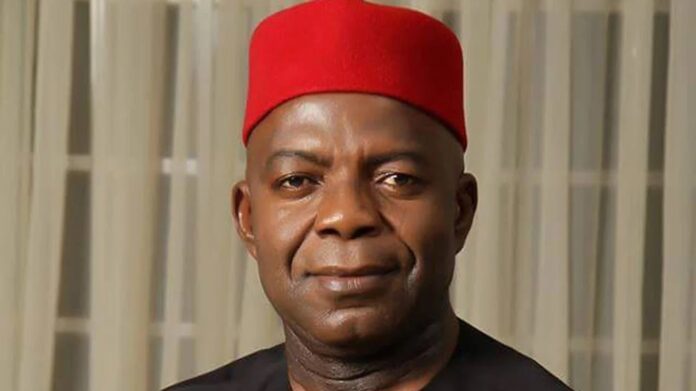Time for Abia Diasporas to come home and invest
By Nnanna Ijomah
It is common knowledge the world over and indeed common practice that immigrants and their descendants contribute greatly to the development of their home countries, countries of origin or ancestry. They do so not only financially but also through business development, investments, knowledge and skills exchange, participation and financing of community projects, volunteer programs and more.
The role of diaspora especially in the economic development, foreign exchange stabilization and augmentation of third world economies especially in Africa and Latin America in recent years has become a topic of policy debates as most governments have come to recognize the contributions of their citizens to their economic development which in turn have necessitated the setting up of special offices to deal with diaspora affairs.
This fact is epitomized by the appointment of a Special Adviser For Diaspora Affairs by the Buhari administration, hence it was recently reported that in the last eight years Nigerians living in diaspora remitted back to Nigeria, a whopping $160 billion. Today in Nigeria, it is said that diaspora remittances have eclipsed foreign exchange earnings from the sale of crude oil and more than 11 times the total sum of Foreign Direct Investment (FDI) into the country. Unfortunately a large percentage of these remittances are for consumption and social support rather than for investment purposes.
In view of this development, it has become necessary for federal and state governments in Nigeria to reassess the way they relate to the Diasporas in terms of their better integration in the developmental policy formulations and implementation. For too long the federal government has basically ignored the investment possibilities inherent in diaspora remittances while paying more attention to the foreign exchange stabilization and augmentation such remittances provide.
The same can be said of the many state governments of the South South, South East and South West from where a majority of Nigerian Diasporas emigrated from to the detriment of their economic development. It is therefore very heartwarming to have a new administration in Abia State that is willing and poised at involving Abia Diasporas with development efforts such as co-funding projects, investing in industry and technology as well as tapping diaspora networks and consulting with diaspora groups and individuals in such specific issues of development about which they have knowledge and expertise.
The Alex Otti administration knows the importance and understands the role migration plays in the economic development of countries and in this case, states of origin and destinations alike. Here in the United States and especially in cities like New York, Houston, Washington DC, Atlanta which make up the largest metropolitan population of Nigerians living in diaspora, studies show that Nigerians constitute the largest number of educated immigrants living in the United States.
READ ALSO: Time to invest in Nigeria is now, Elumelu tells Indian investors
They are known for their educational attainment, with over 60% from 25 years and older holding at least a bachelor’s degree in such disciplines as Medicine, Engineering, Computer and Digital technology, Nursing, etc. Many occupy top positions in both the public and private sectors of the U.S economy. There is no doubt that a sizable number of these Nigerians are from the South East and Abia State in particular where their services and expertise in their various professions if properly coordinated and harnessed will be of immense value to the state. In such sectors as Agriculture, Healthcare, Education, Digital technology Abia Diasporas can bring their knowledge, expertise and finances to bear.
Job creation is one of the most urgent imperative in low and middle income economies like Abia State with the fastest growing population mostly young people suffering presently from the high rate of unemployment occasioned by 24 years of neglect by the various PDP administrations. It is estimated that small and medium scale industries are the richest source of new jobs.
For this reason, support for diaspora entrepreneurship should be a common focus of development cooperation by the Abia State government, hence there must be a program to support the creative and innovative enterprise of Abia citizens living in the diaspora such as creating a business incubator to bring start-up ideas for business to fruition as well as offer networking and skills development opportunities to support the implementation of business plans.
To achieve these goals, the Abia State government must do the following, namely:-
- Provide grants to development and investment projects initiated by diaspora groups and individuals.
- Support diaspora entrepreneurship and consult with diaspora organizations on development policies and projects.
- Provide assistance and an enabling environment for diaspora investors.
- Encourage skills acquisition and temporary return of Diasporas to assist with special social and developmental needs.
- Link diaspora volunteers with areas of need especially in the healthcare, educational and agricultural sectors.
- With the help of diaspora organizations, attempt a census count of Abians living in diaspora.
- Establish a data framework of diaspora remittances that come into Abia State hence accurate statistics will be essential to the government in policy formulation and execution.
- Establish a monitoring and evaluation process of diaspora investments towards ensuring the efficient management and sustainability of these investments, since most of the diaspora investors are usually not physically present in the country for most of the time.
- Establish a registry of all diaspora organizations in Europe, Asia and the America’s.
- Help identify reliable diaspora organizations and individuals desirous of investing in the state, sponsor or contribute to community projects as well as volunteer their skills in sectors of need.
It is time for Abia Diasporas to think beyond remitting money to folks back home strictly for social welfare and consumption needs. That does not mean such remittances are not important. For those who plan on returning home someday after retirement, this is the time to invest in a business, skill acquisition, social service or small scale industries.
For those in need of extra help in meeting these developmental needs there exists foreign organizations set up by some Governments in Europe with the sole purpose of assisting third world immigrants desirous of going back to their home countries to help as volunteers and to invest. Germany’s Center for International Migration and Development for instance assists migrants who want to return to their home countries with their job search, relocation and travel. In some cases, it also supplements their local salaries for a limited time. It also arranges short term assignments for diaspora volunteers.
In 2019 for example, nearly 800 diaspora experts in Germany participated in this program. Apart from Germany, many other European countries partner with the organization, “Migration For Development In Africa ” MIDA in deploying diaspora professionals in different fields to fill skill gaps and train partners in their countries of origin.
“Return of Talent Programs” is another of such endeavours financed by donor countries by way of assisting in the temporary return of qualified diaspora nationals in priority sectors that are pre-identified. Critical institutions in that sector are chosen and diaspora experts who are willing to participate are sponsored. There is no doubt such organizations or something similar exists in the United States. What is needed is for Abia Diasporas in Europe, Asia and the America’s to seek out such organizations to augment their personal and organizational needs.
There is always the reluctance of detractors to embrace diaspora cooperation and investment due to the exertion required in identifying local partners in addition to overcoming the cultural and experiential differences with them. There is also the problem of trust. The lack of trust has always been a great impediment to investing by Diasporas. In situations where friends and family members cannot be trusted to faithfully apply funds provided for the purpose for which they were sent, the issue of trust becomes a huge problem that needs to be addressed and overcome.
It is for this singular reason that diasporans who need to invest in critical sectors of the Abia economy need to partner with the state government so as to ensure the success of their investments and developmental objectives. Abia State under the able leadership of Dr. Alex Otti needs all the help it can get from its thousands of diasporans abroad. It is now up to us to meet that challenge.
- Nnanna Ijomah was a member of Dr. Alex Otti Campaign Media Team.













